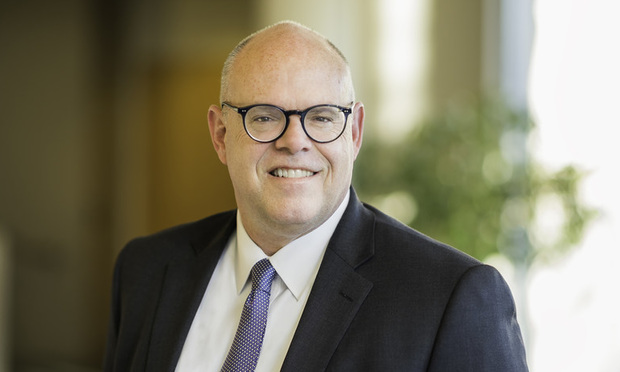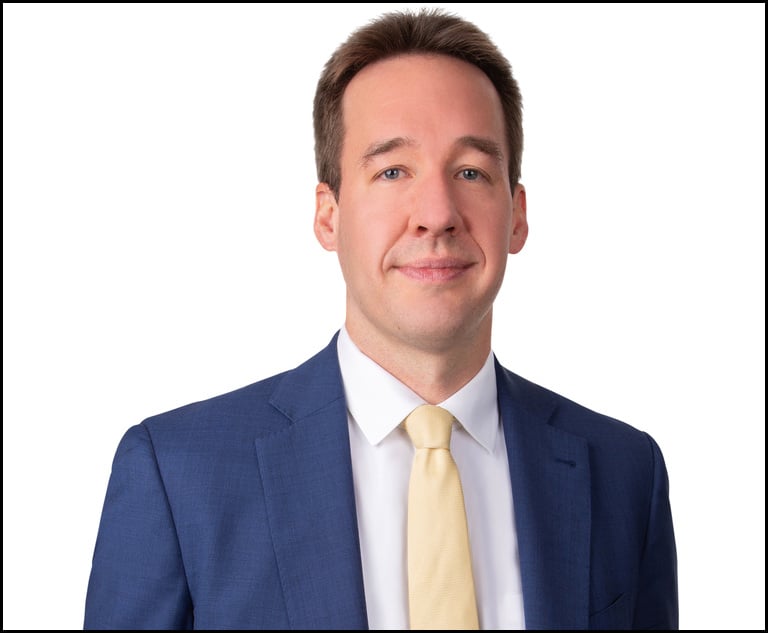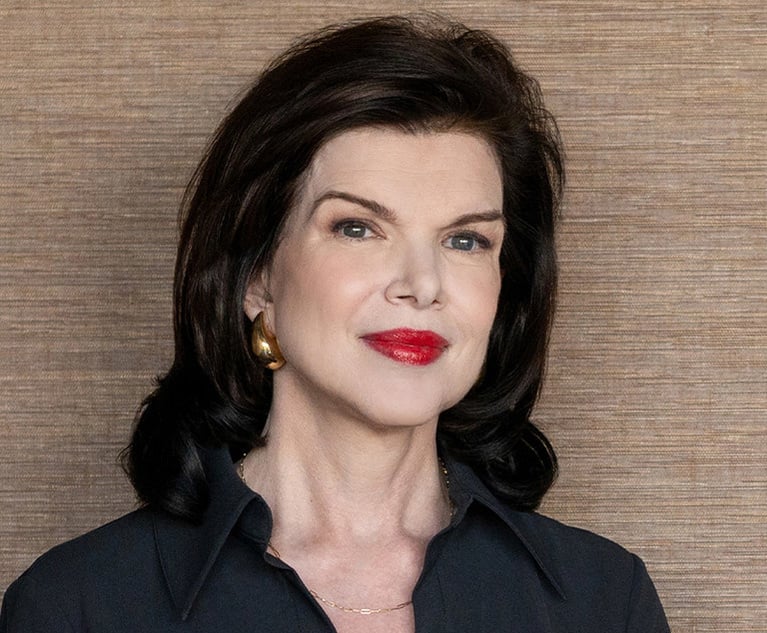Wilson Sonsini Launches Software Developer Subsidiary to Automate Legal Services
The Silicon Valley-based firm wants to automate parts of its work to attract a broader swathe of clientele.
February 05, 2019 at 05:30 AM
5 minute read
 Douglas Clark, managing partner of Wilson Sonsini Goodrich & Rosati. (Courtesy photo)
Douglas Clark, managing partner of Wilson Sonsini Goodrich & Rosati. (Courtesy photo)
Aiming to attract a broader mix of clients, Wilson Sonsini Goodrich & Rosati on Tuesday became one of the first Am Law 100 firms to formally launch a software development business.
The Silicon Valley-based firm has launched a subsidiary called SixFifty, named after the firm's address and area code in Palo Alto. Its first automated legal product, launching this spring, will draft documents for compliance with the California Consumer Privacy Act, which takes effect in January 2020.
Beyond that, SixFifty is building out a legal services automation platform that will ultimately provide services for both companies and consumers, said Douglas Clark, Wilson Sonsini's managing partner. SixFifty, like most automated legal services, will not provide legal advice.
“We're not trying to replace ourselves,” Clark said in an interview. “We're trying to help clients access sophisticated legal knowledge more efficiently.”
Wilson Sonsini's subsidiary is an early example of the various approaches law firms may take as they slowly implement technology into their business models. Chapman and Cutler, a Chicago-based Am Law 200 firm, last year became one of the first firms to sell a piece of software that was designed in-house at a law firm. Meanwhile, Atrium Law, a start-up funded by Silicon Valley venture capitalists, has developed a two-pronged business model more akin to a subsidiary that pairs a software development company with a more traditional law firm.
SixFifty has not received outside investment, Clark said, and is a wholly owned subsidiary of Wilson Sonsini, which in 2017 had revenue of $797 million and profits per equity partner of about $2.2 million. The subsidiary is funded through the firm's balance sheet, Clark said.
SixFifty is led by Kimball Parker, who previously founded an innovation subsidiary at Salt Lake City-based Parsons Behle & Latimer that developed an automation tool to draft compliance documents for the General Data Protection Regulation (GDPR). Parker also oversees the LawX legal design lab at Brigham Young University's J. Reuben Clark Law School, which garnered attention for a website its students developed to help litigants fight debt collection cases without a lawyer.
Lincoln Porter, who worked with Parker on both those projects, has also joined SixFifty as chief information officer and chief technology officer.
The GDPR tool Parker helped develop at Parsons Behle sold an initial set of compliance documents for about $10,000, which Parker at the time said was about 10 percent of what those documents might cost to be completed without the technology.
Clark said Parker's previous success with the GDPR tool was “an important proof of concept,” but that SixFifty's approach was “something very unique and special with CCPA,” the California privacy regulation.
For his part, Parker said he was attracted to the partnership with Wilson Sonsini because of the quality of legal advice the firm's lawyers can offer and bake into their automated products.
For instance, the firm's privacy and data protection practice that is helping to develop the CCPA documents includes Lydia Parnes, the former director of the Bureau of Consumer Protection at the Federal Trade Commission; Chris Olsen, the former assistant director of the FTC's Division of Privacy and Identity Protection; and Beth George, former deputy general counsel to the U.S. Department of Defense.
“What consumers want is the efficiency of automation and machines but with the expertise and judgment of a human behind it,” Parker said. “And so the future of the law, to me, is this human-machine mix. And what makes this really interesting is I'm confident we can build a very good machine, and Wilson Sonsini is the best human expertise in this field.”
The CCPA, which gives customers new levels of control over how businesses use or acquire their personal data, is anticipated to impact more than 500,000 companies in the U.S., according to an analysis by the International Association of Privacy Professionals. Most of those companies are small or mid-sized businesses, which may not be part of the high-end clientele Wilson Sonsini typically serves. Porter said those businesses would be in the sweet spot of SixFifty's offering.
“There are millions of businesses and people who would love to have [Wilson Sonsini's] expertise at their disposal,” Parker said. “And we thought we can take the expertise of Wilson lawyers, which is as good as anywhere in the world, and we can automate some of it to make it available to more businesses and people. And that is so exciting.”
Clients of the subsidiary don't necessarily have to be Wilson Sonsini clients, Parker and Clark said. But their hope is that some clients who use the automated SixFifty service will also use Wilson Sonsini's lawyers for legal advice.
Clark said he was not concerned that automating legal work would cannibalize what lawyers have traditionally done by hand.
“My view, and this could be just a function of what I've done for nearly 30 years, is that the judgment and expertise [lawyers] bring on complex matters … will never be automated and will never be supplanted by machine learning,” Clark said. “There are many functions, however, within the ambit of what law firms have traditionally done that can be made so much more efficient by using technology and making it more available to clients and prospects.”
Read More:
Law Firm or Software Developer? Chapman and Cutler Is Now Both
The Law Firm Disrupted: Winning Business by Slashing Prices—Do Midsize Firms Have an Edge?
This content has been archived. It is available through our partners, LexisNexis® and Bloomberg Law.
To view this content, please continue to their sites.
Not a Lexis Subscriber?
Subscribe Now
Not a Bloomberg Law Subscriber?
Subscribe Now
NOT FOR REPRINT
© 2025 ALM Global, LLC, All Rights Reserved. Request academic re-use from www.copyright.com. All other uses, submit a request to [email protected]. For more information visit Asset & Logo Licensing.
You Might Like
View All
Alston & Bird Adds M&A, Private Equity Team From McDermott in New York
4 minute read
Veteran Federal Trade Law Enforcer Joins King & Spalding in Washington
4 minute read
Houston Trial Lawyer Mary-Olga Lovett Leaves King & Spalding to Open Boutique
3 minute readTrending Stories
Who Got The Work
J. Brugh Lower of Gibbons has entered an appearance for industrial equipment supplier Devco Corporation in a pending trademark infringement lawsuit. The suit, accusing the defendant of selling knock-off Graco products, was filed Dec. 18 in New Jersey District Court by Rivkin Radler on behalf of Graco Inc. and Graco Minnesota. The case, assigned to U.S. District Judge Zahid N. Quraishi, is 3:24-cv-11294, Graco Inc. et al v. Devco Corporation.
Who Got The Work
Rebecca Maller-Stein and Kent A. Yalowitz of Arnold & Porter Kaye Scholer have entered their appearances for Hanaco Venture Capital and its executives, Lior Prosor and David Frankel, in a pending securities lawsuit. The action, filed on Dec. 24 in New York Southern District Court by Zell, Aron & Co. on behalf of Goldeneye Advisors, accuses the defendants of negligently and fraudulently managing the plaintiff's $1 million investment. The case, assigned to U.S. District Judge Vernon S. Broderick, is 1:24-cv-09918, Goldeneye Advisors, LLC v. Hanaco Venture Capital, Ltd. et al.
Who Got The Work
Attorneys from A&O Shearman has stepped in as defense counsel for Toronto-Dominion Bank and other defendants in a pending securities class action. The suit, filed Dec. 11 in New York Southern District Court by Bleichmar Fonti & Auld, accuses the defendants of concealing the bank's 'pervasive' deficiencies in regards to its compliance with the Bank Secrecy Act and the quality of its anti-money laundering controls. The case, assigned to U.S. District Judge Arun Subramanian, is 1:24-cv-09445, Gonzalez v. The Toronto-Dominion Bank et al.
Who Got The Work
Crown Castle International, a Pennsylvania company providing shared communications infrastructure, has turned to Luke D. Wolf of Gordon Rees Scully Mansukhani to fend off a pending breach-of-contract lawsuit. The court action, filed Nov. 25 in Michigan Eastern District Court by Hooper Hathaway PC on behalf of The Town Residences LLC, accuses Crown Castle of failing to transfer approximately $30,000 in utility payments from T-Mobile in breach of a roof-top lease and assignment agreement. The case, assigned to U.S. District Judge Susan K. Declercq, is 2:24-cv-13131, The Town Residences LLC v. T-Mobile US, Inc. et al.
Who Got The Work
Wilfred P. Coronato and Daniel M. Schwartz of McCarter & English have stepped in as defense counsel to Electrolux Home Products Inc. in a pending product liability lawsuit. The court action, filed Nov. 26 in New York Eastern District Court by Poulos Lopiccolo PC and Nagel Rice LLP on behalf of David Stern, alleges that the defendant's refrigerators’ drawers and shelving repeatedly break and fall apart within months after purchase. The case, assigned to U.S. District Judge Joan M. Azrack, is 2:24-cv-08204, Stern v. Electrolux Home Products, Inc.
Featured Firms
Law Offices of Gary Martin Hays & Associates, P.C.
(470) 294-1674
Law Offices of Mark E. Salomone
(857) 444-6468
Smith & Hassler
(713) 739-1250











